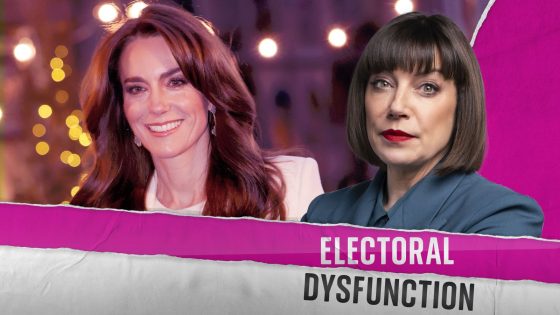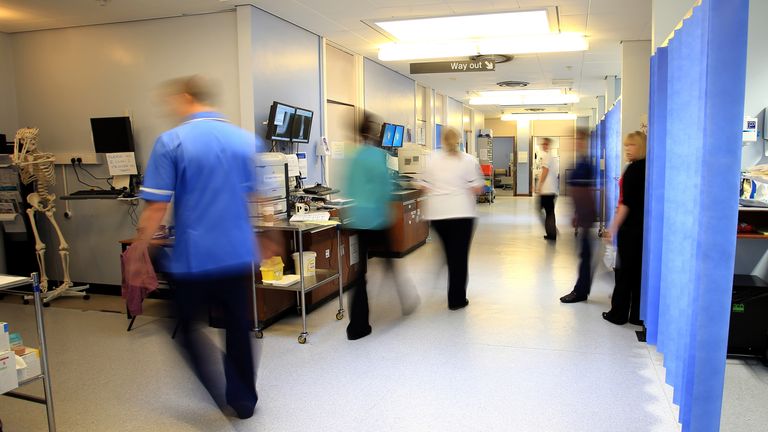There is an edict in our democracy that politics and royalty must not mix.
Sure, we live in a “constitutional monarchy” where King Charles is head of state, wading through government papers and meeting the prime minister weekly.
But when it comes to the task of setting the political direction and framing our nation’s political debate, the Royal Family has to zip it and remain entirely neutral.
And just as the royals don’t stray into political territory, political editors like myself and politicians don’t talk much about the Royal Family.
In fact, politicians actively swerve any questions inviting them to comment on the latest tabloid drama around the royals.
But this week on Electoral Dysfunction, we’ve broken with our own conventions to discuss the Princess of Wales’s announcement that she has cancer, and ask whether this might be a moment when the cultural and social role the Royal Family play in our national life takes a more political tilt.
Because the princess’s diagnosis – on the heels of King Charles’s announcement he has cancer – has started a conversation about cancer that the British people are perhaps taking into the political dimension.
👉 Listen above then tap here to follow Electoral Dysfunction wherever you get your podcasts 👈
The realisation that anyone can find themselves in this position is throwing into sharp relief the state of our healthcare system.
In the same way some people might be asking, “could I have cancer?”, so too are we assessing what the prognosis is for a creaking NHS to treat us in a timely way.
This was the point made to us by listener Sophie, who emailed in to say that while she had “every sympathy” with the Princess of Wales and King Charles, “I wonder if it is now an appropriate time to start a discussion about the reality of cancer treatment for the majority of people in the UK?”
Because while NHS waiting lists are at record high, the pandemic stalled so many patients presenting for cancer screening and testing.
NHS guidelines aim for 75% of patients with suspected cancer to receive a diagnosis within four weeks of a referral, while 85% should wait less than two months for their first treatment.
But the last time these targets were met was back in 2015.
In England and Wales, just over one in three people wait too long for treatment, while in Scotland – where targets are slightly different – a quarter wait more than two months to start treatment.
The public seem to have had enough, with The King’s Fund and Nuffield Trust think tanks’ annual report – out this week – finding that public confidence in the NHS is at its lowest level since polling began in 1983, with approval ratings dropping for almost all NHS services.
Long waits for a GP or a hospital appointment were cited by 71% of people as a key reason for their dissatisfaction.
Half of those surveyed supported rising taxes and spending more on the NHS, as we gear up for a general election in which the state of our health service will be the subject of very national debate.
Labour MP Jess Phillips says “everybody feels nothing but sympathy” for Princess Catherine. But she also voices on our podcast perhaps what many of our listeners will be feeling if they are watching someone struggle with this awful disease and frustrated that treatment came too late.
“[The royals] are going to be treated a lot better in their cancer diagnosis than my family and my sister-in-law who is currently dying of cancer and has small children just like Catherine,” she said.
“The reality is that not everybody has vigilance on them [in screening and testing for cancer]. I’m not saying for a second that the Royal Family shouldn’t have vigilance and everybody in the country knows they will have more vigilance.”
But Jess also thinks that the royals should perhaps give “some nod of recognition to the fact its not as easy for others”.
She added: “I think that if they don’t address that particular issue, I just think that it’s dangerous and people like me who feel sympathy for them start to feel a bit hurt by it.”
Political territory that the Royal Family will be loath to touch, let alone try to traverse.
But as figureheads of the nation, their diagnoses, as well as opening up a well of sympathy, puts a struggling NHS into the national spotlight again.
Tap here to follow Electoral Dysfunction and get it every Friday from wherever you get your podcasts
Source Agencies




